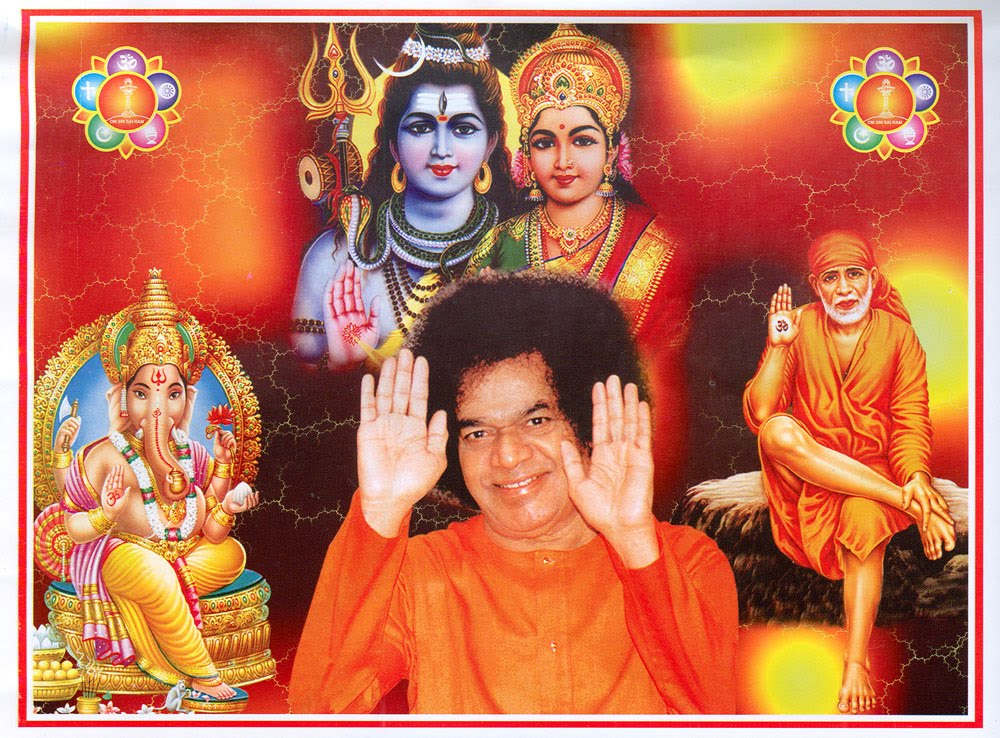|
|
Loving Sai Ram and greetings from Prasanthi Nilayam. Here, we are once again, dealing with spiritual questions from our readers/listeners. This is the fourth session and I do hope that from your point of view, you are finding this series to be satisfactory. As you would have realised by now, the questions we deal with often overlap. Hence, there would be a certain amount of repetition in our answers too, which, I hope, you would bear with. Also, you might sometimes feel that the answers are not exhaustive enough. Well, that is deliberate. We have to make a choice between reasonably short answers that would convey the essence, or long and rambling answers that would lose the listeners and readers totally. What we are attempting to do is to strike a balance; we try and give the essence first time, and in later sessions, reiterate the basic points in different ways and in different contexts, so that the lessons sink in and get registered permanently. This is a standard trick in teaching, the outward spiral approach as it is called, and I am merely following that tactic.
Let me now see what is in the bag this time for us. There are four questions, all related as usual, and they are as follows:
QUESTION 1: How can we realise our innate Divinity?
QUESTION 2: When will modern man be fit to tread the spiritual path? Why does he not follow it?
QUESTION 3: How can we realise our true Self by looking within?
QUESTION 4: How and why is the bliss given by Self-realisation true and permanent?
The four questions that I just read out and which I hope to deal with in this talk are, as expected not only interlinked but also quite interesting. Let me start with the first question, which deals with how one can realise his or her intrinsic Divinity. Here, devotees of Bhagavan have a big head start, because time and again, Swami has reminded us that we all are Sparks of the Divine, the Embodiments of the Atma, and so on. The question now becomes, “If He tells us that ever so often, then why does not that fact register with us?”
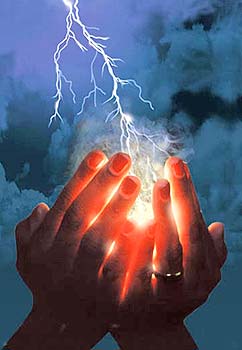 | |
The spark of the Divine resides within us |
The answer to that is simple. Most of us do know in our head that we are God or have at least come from God, and therefore have some Divine genes within us. But merely knowing a fact is not enough. The big question is: “Is that knowledge in any way influencing our actions and our lifestyle?”
Let me give a simple example to illustrate my point. Everyone knows that while the demand for water is rapidly increasing, its supply is at the same time tending to shrink. It follows immediately that we ought not to waste even a drop of water; instead, we should do everything to conserve water as much as possible and also share it equitably with all, so that there are no conflicts due to some people acquiring a sort of monopoly over water resources. But does that happen? Hardly; why? That is the question we now must address.
Knowing a fact of life becomes meaningful only under the following circumstances: Firstly, that fact must get imprinted in the heart and not merely in the head. Thereafter, the heart must regularly influence all actions based on that particular fact – that is, when knowing something would produce any impact. To use Swami’s words, this is how bookish knowledge is converted into practical knowledge. If that conversion does not take place, then all the knowledge in the world is of little use.
We have thus reduced the problem to: “What prevents people from doing something, when they know it is good?” The short answer to that is ignorance, and so, I shall now turn to a discussion of ignorance - spiritual ignorance to be more precise. The question now becomes how to remove this spiritual ignorance. Every day in our life, all of us use some object or the other made of steel, sometimes many objects, and often more than once. I am sure you would agree with that. Now is steel found as steel on earth? No; what God has provided us with is iron, and that too in the form of ore.
Usually, this ore is in the form of some oxide of iron, mixed with mud and rock. Now what does man do to make steel? He first mines the iron ore, then refines it to make iron of some sort – this is done in huge steel plants – after which metallic iron is suitably alloyed to produce a variety of specialised steels needed for surgical instruments, ultra-high vacuum systems, nuclear reactors and so on. What I am leading up to is the fact that one does not get the kind of steel one wants for making the objects one needs unless one first refines the ore and further processes it as required – that is the point I wish to make.
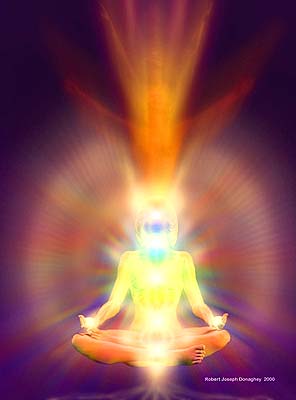 | |
Dedicated, intense inner cleaning allows our inate divinity to shine from within |
Let us now go back to our question; it asks how we can realise our innate Divinity. The first point is that we must at least believe that we are intrinsically Divine. People ask: “How can that be?” Well, the answer to that is very simple.
Everyone knows that his or her biological genes come from parents and indeed ancestors; not merely that, modern science has revealed that some genes are very similar to what fish, rats and other such species have; which means that our genes have a long history going back far in time.
Let me push that a little bit further. Our bodies are made up of atoms and these go back literally to the creation of our Universe. And who created our Universe? God, of course. So I first argue that whether we like it or not, there are Divine genes in all of us – that fact must be accepted. Next, we must allow these Divine genes to make their presence evident. It is like saying, “There is a lot of good iron here in this place; so let us mine it and make steel out of this ore.”
In the same way, the starting point must be, “I accept the fact that I am Divine in origin and that there are Divine genes within me. All I must do is to make them manifest.” The question now becomes: “Why do they not manifest right now and what must I do to make that happen?”
This precisely is where the iron-ore cum steel making analogy enters the picture, that is to say while the 'raw material’ is there, some refinement is needed. To get down to brass tacks, let us ask, “When can we say a person has recognised the Divinity within and that Divinity now shines in that person?”
To answer this question, we must first know when we would describe a person as having Divine qualities or a Divine aura? Luckily, Krishna Himself has answered that question and He says that wherever Pure Love, Selflessness, Compassion, Sathya, Dharma, etc. shine, there one can see the effulgence of Divinity.
So, it all boils down to this: If the effulgence of Divinity is already latent within, thanks to our innate Divinity, then why does it not show up? Imagine a lamp with a powerful bulb within but which is covered with muck on the outside. Then, no matter how powerful the bulb is, the light that emerges would be at best rather dull. Remember, even the light from the all-powerful and ever so bright Sun can be diminished by a cloud. Thus, what eclipses our innate Divinity is the cloud of spiritual ignorance that covers the core of our being. If somehow we are able to blow away that cloud, then our innate Divinity would automatically shine.
So, if we are keen to realise our innate Divinity, then:
- We must believe that we are indeed Sparks of the Divine,
- Recognise that there is a cloud of spiritual ignorance covering this latent Divinity, and
- Take steps to generate a strong wind that would blow away this cloud.
If we did all that, the latent Divinity would shine forth in full measure. So how do we generate that wind? That is a big question in itself that maybe we shall come to later, but if you want the answer in one word, it is Sadhana. If you are in hurry to know what Sadhana is all about and cannot wait for a future article, then I urge you to straight away seek the answer in Sai literature – you would find plenty to keep you busy! Good luck!
With this, let me now move on to the second question, which is:
QUESTION 2:
When will modern man be fit to tread the spiritual path? Why does he not follow it?
Answer:
There are two questions here and I think I shall start with the second one, for reasons that would become obvious soon. Modern man is driven by one primary instinct: “If I do such and such a thing, what’s in it for me? If indeed there is something, then how soon would I get that benefit?” In other words, it is all about large and quick returns on investment, or short-term results, to put it differently. If someone were to tell him, “This is very good for you but you know it would take a long time before you start seeing benefits,” his reply would be, “Oh yeah? Thanks for the information but I prefer to make my investment elsewhere.”
 | |
The spiritual path draws one towards the center - towards God - but requires a long term commitment |
In spirituality, there are no short cuts. If you want very high-quality steel for deep space applications, bazaar (low-quality) steel would not do; such steel would have to be specially made and very carefully.
So to get back to the second part of the question, my answer would be: Man today is not bothered about following the spiritual path because he does not see any immediate or practical advantages in that for him. If he wants to take to spirituality on the basis of a mundane cost-benefit analysis, then he is going to miss out for sure, no doubt about it.
This takes us automatically to the first part of the question, which is: “When would modern man be fit to tread the spiritual path?” I would say, first there must be a keen desire to go on that path; without that desire, without that hunger for God, without that passion to become one with God somehow, man is not even going to be aware that there is a spiritual path and that it can lead to eternal bliss or ananda, as opposed to transient pleasures that drinking or gambling or even chasing corporate success can give.
Now how does one develop that hunger? Well, it is like asking: “When does a couch potato want to stop eating chips by the ton and develop the desire to be a strong and healthy person with a passion for outdoor life?” Such transformations can and do happen when there is a deep yearning from within. Where spiritual transformations are concerned, God in human form is here precisely to help us change, but how to bring about such a change, what must one do to facilitate it and so on are matters that I shall take up later when dealing with questions relating specifically to those issues. Right now, the two points that emerge from the question discussed thus far are:
- Where spirituality is concerned, we must not approach it from a cost-benefit perspective, and
- We had better develop a hunger for God before we start thinking of getting on the spiritual path.
Before I get on to the next question, I would like to suggest that those of you who are reading this article as a group, might perhaps discuss and debate the points made by me. This would not only help you to gain better clarity but might also throw up other important questions and points not considered by me. So dear readers please do be pro-active and write to us the way readers of newspapers flood the editors of the papers they read, with all kinds of comments.
Moving on, the next question is:
QUESTION 3:
How can we realise our true Self by looking within?
Answer:
As a prelude to answering this question, I must first comment upon two important words that occur in this question. The first is the word “within”, while the second such word is “Self”. When we look at the wide world around us, we always speak of it as being external to us, meaning that the world surrounds the body. As for what is within, by that we usually mean that which lies beneath the skin of the body. What lies beneath the skin? When asked this question, we usually respond in terms of organs, bones and so on. However, we also often talk of a subtle entity called the mind.
Ask anyone where the mind is, and he or she would say it is within. And yet, no one has ever seen this mind! We simply say it is within because each mind is intrinsic to that person. Similarly, there is “within” each person the “Divine Spirit” that earlier I referred to as the atma. Now of course you might ask, “If the Atma is in every person, does that mean that each individual has his or her own Atma?” No way! It is the same atma that is present in all. How can that be, you might wonder. Well, consider air; it covers the entire earth like an onion skin. And in the process, a bit of this air is also present in the lungs of every living being. Thus the air is within each being and at the same time it is also everywhere.
| |||
In the infinite ocean of God, we are drops of His divinity |
Let us now focus on that “portion” shall I say, of the Universal Atma that is associated to a particular person. Just as we say the mind of a person is within, we also say that the associated atmic aspect is also within. This atmic aspect is called variously as the Real Self, the True Self or simply the Self, with a capital S. Now the word “self” is often used in Vedanta and one must be very careful when discussing the self-business using the English language. Vedanta makes a clear distinction between two types of Self that might be associated with a given person; however, when translating, we often tend to use the same word “self” for both the contexts, and this has created enormous confusion in the minds of those who are not fully conversant with Vedanta.
From the spiritual point of view, there are actually two “selfs” within; one, a Real one and the other, a bogus one. The latter, a phoney, is sometimes called the Lower Self and is really an aspect of the ego. The former, on the other hand, is what I earlier referred to as the Higher Self or the Real Self, and is nothing but our friend, the atma. So the question we are trying to answer could be restated as follows: “How can we realise that we are not the false Lower Self or the Ego Self - but the Higher Self?”
Obviously, the first thing is to know that there is an entity called the Real Self, which is distinct and separate from the Ego Self or the Lower Self. Most of us do not know this important truth, and indeed, it is in order to make this clear, that almost the very first thing that Krishna teaches Arjuna in the Gita is: “Arjuna, you are not just the body but the atma!”
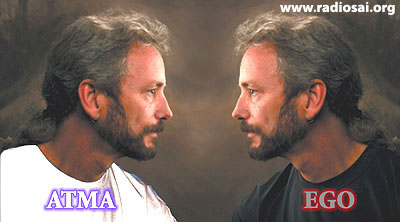 | |
Which reflection do you see? |
So, we must be conscious of the fact that there are actually two entities within that answer to the name “self”; one of them is real and the other phoney. Often, we are totally ignorant about the Real Self; and if we are aware it exists, we do not bother one bit about it. Why is that? Because we are deluded and misled by our ego. We all the time pay attention to the ego and pamper and massage it in every way possible, fattening it to mountainous proportions.
The question thus becomes: “How do we decrease our ego?” The question is important because when we start doing that, automatically, the Real Self within us begins to manifest more and more. I am sure this may not be quite clear to most and maybe I should offer a few words of explanation.
What are the characteristics of a person who is very egoistic? He would be mostly conscious of himself, his success, his ambitions, his achievements and so on. All this would likely make him rather selfish, sometimes cunning and scheming, and prone to get jealous when he does not succeed but his competitor does.
Consider now a person who is the very opposite, that is to say, such a person is always very kind, eager to share without any expectation of anything in return, hardly focussed on rewards and achievements, generous to a fault, ready to forgive, compassionate and so on. Believe it or not, there are such people. In the case of such a person, it is the Higher Self or the Atma that is reflected in the personality, that is to say, in what the person thinks, says and does. Indeed, in the Gita, Krishna tells Arjuna that wherever virtues like I have just mentioned shine, there one may find the effulgence of Divinity.
So, if we want to realise our True Nature, that is realise that we are indeed the Atma and not the bogus entity called ego that masquerades as the Self, then we must spiritually cleanse ourselves in every possible way – this is what Swami means by sadhana. By practicing sadhana systematically and with real passion, one can slowly get on to the path of Self-realisation.
Now to the last question of today’s session, which is:
QUESTION 4:
How and why is the bliss given by Self-realisation true and permanent?
Answer:
You would have noticed I ended my response to the previous question by using the word Self-realisation; that is because that very word occurs in this question. The question posed is an interesting one, because it alludes to bliss that is permanent, implying thereby, there could also be happiness that is transient. Indeed there is and it is the confusion that humans have between these two that is almost always the cause of suffering and misery.
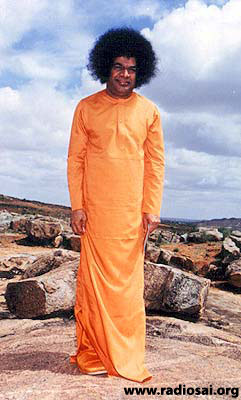 | |
Think God all the time and you become God |
Let me explain. The first thing we have to note is that ananda, which means permanent happiness, and which in English is usually referred to as ‘bliss’, is the very nature of the atma. That is why when a Yogi goes into a trance he is in a blissful state, because in that state, he is not aware of anything and experiences an amazing sense of Oneness, that is to say, all apparently different entities fuse into one single Cosmic entity, namely the atma. In other words, when the Yogi achieves a union with the atma he is filled with bliss. That is why Yogis often like to go into a trance.
What about ordinary people like you and me? We too want to be happy, in fact, happy all the time if that is possible. So what do we do to seek happiness? We try everything possible from playing golf, watching TV, going out to dinner or gambling, travelling and so on. Oh yes, we do get excited - but bliss, Ananda or permanent happiness? Never. Why? Because what we get is pleasure, which, as Swami often reminds us is nothing but an interval between two pains.
Why is that? Swami gives the answer; He says, “O man, don’t you know this world is transient? How can you ever get permanent happiness in a world that is transient? It is stupid to try for it. By its very nature, this world is a dual world, meaning it is a package in which pleasure and pain, happiness and sadness, joy and misery come in alternation; no escape from that.”
So, what must one do in order to achieve ananda? Swami gives the answer to that also; He says: “Happiness is union with God!” To put it simply, if we master the art of going through life thinking of God all the time and in the firm belief that God is the doer and would take care of us, then we would hardly be bothered even if some inconvenience comes our way. That is why Swami often says: ‘Start the day with Love, spend the day with Love and end the day with Love.’ If you want a hot tip from me, I would say that an easy way of doing that is to tune in to Radio Sai the very first thing in the morning, and stay tuned all day!
And I shall end on that advertising note. I do hope you are getting something out of it. As you would certainly have noticed if you are a regular reader, many of the things I mentioned today have been said before. That is right, the formulae are neither new nor all that complicated; the problem is that we easily forget them. The trick then is to develop a good memory and keep these facts in mind always. That is just another way of saying, always stay tuned to God and never forget Him. Krishna assures that if we do that, then while we have a body, we would have long spells of happiness, and when we give up the body we would merge with Him and thus enter into a state of permanent bliss.
With that, I would like to close. Thanks for taking the trouble to read this part of the series and hope you would join me again next month.
Jai Sai Ram.




















